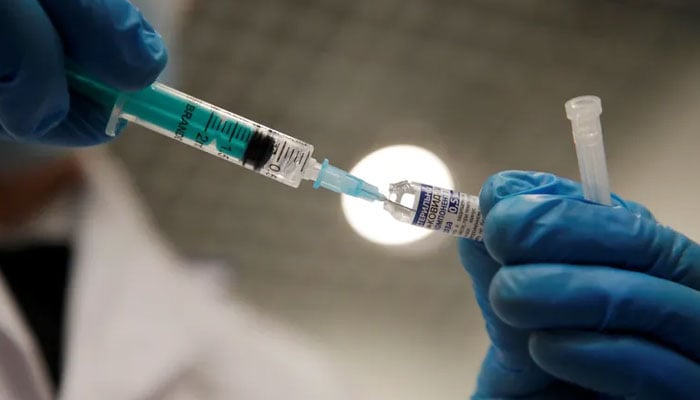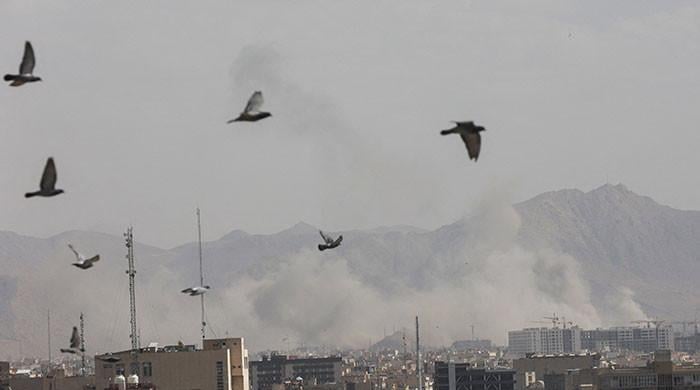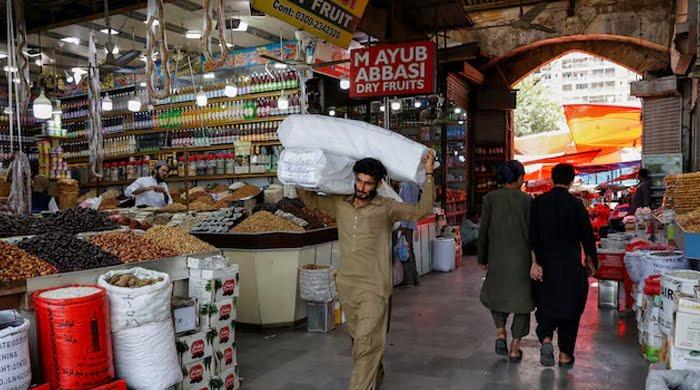When aid becomes a weapon
US decision to restrict approval of two COVID vaccines reflect country's potential to push millions of people towards death
July 10, 2025

The recent decision of the American administration to restrict the approval of two COVID vaccines indicates that the US cannot only decimate millions of people by imposing wars and conflicts through its state or non-state proxies but that it has also the potential to push millions of people towards death and miseries through non-military even if they are Americans themselves.
The decision was made by Dr Vinay Prasad, who works under US Health Secretary Robert F Kennedy Jr A controversial figure, Kennedy has allegedly promoted conspiracy theories about COVID-19 vaccines in the past.
It is believed that the FDA approved the vaccines in May after months of analysis by rank-and-file FDA reviewers. According to a report of the Associated Press' health writer Matthew Perrone, "Internal correspondence shows Prasad disagreed with staffers who planned to approve the shots for everyone 12 and older, similar to previous COVID vaccines. The scientists had concluded the benefit from the vaccines and the risk of COVID-19 outweighed the risk of possible side effects which are rare. Prasad argued the shots should be limited to those who face special risks from the virus — seniors or children and adults with underlying medical issues".
According to the Centres for Disease Control and Prevention, COVID-19 is still a public health threat leading to 32, 000 to 51000 American deaths since last fall. Most at risk for hospitalisation are seniors and children under two, especially infants under six months.
Experts believe that it will have catastrophic consequences for ordinary Americans. Many think that it would force healthy children’s families and pregnant women to buy vaccines on their own, which might cost them $136 to $230 per dose. So, imagine a family of four: it will have to spend $900 if it wants to be fully vaccinated. This is out of reach for the vast majority of Americans.
While this decision might only affect American citizens, a number of other decisions made by Donald Trump’s government could jeopardise the lives of millions over the decades. For instance, the US has also withdrawn support for the Global Alliance for Vaccines and Immunisation (GAVI), pulling all future funding for the vaccine body. The vaccine alliance has immunised over 1.1 billion children since 2000, preventing 18.8 million deaths. Gavi models predict that losing US funding could leave 75 million children unvaccinated, causing neomillion preventable deaths over the next five years. Doctors Without Borders warned that “countless children will die from vaccine-preventable diseases”, as over half the vaccines used in humanitarian settings come from Gavi-procured supplies.
It is worth noting that GAVI recently secured pledges of over $9 billion during a summit in Brussels, with new and returning donors contributing to the goal of immunising 500 million children and averting up to 9 million deaths by 2030. The alliance is still in need of over $2 billion. Many on the American Left believe that the Trump administration’s assault on vaccines, which have prevented 154 million deaths globally since 1974, represents a conscious effort to drag society backwards, sacrificing human life on the altar of corporate profit.
The story does not end here. In January this year, Trump withdrew US funding to the WHO after failing to pressure the global health body into declaring China responsible for COVID-19 or accusing it of withholding information regarding the pandemic. Trump began his second term of office by repeating the mantra that China was untrustworthy, accusing Beijing of ‘inappropriate political influence’ in the WHO.
The US is a major donor to the WHO, contributing $950 million, or 14.53% of the WHO’s total budget in 2024, considerably more than the next largest national contributor (Germany, at $215 million) and certainly more than China's paltry 0.35%. The British Medical Journal had feared that the decision would trigger a global health crisis.
In March this year, the funding reduction forced the WHO to trim 25% of its budget. These reductions and cuts to the USAID budget significantly disrupted global health projects and schemes. WHO Director-General Dr Tedros Adhanom Ghebreyesus said, a few months ago that "There are now severe disruptions to the supply of malaria diagnostics, medicines and insecticide-treated bed nets due to stockouts, delayed delivery or lack of funding". Over the last 20 years, the US has been the largest bilateral malaria control donor, helping to prevent an estimated 2.2 billion cases and 12.7 million deaths.
While not all projects of USAID are worth appreciating, some of its services have been recognised globally. Experts believe that the Trump administration’s 83% cut to USAID programmes has threatened to reverse the two decades of public health progress in low-and middle-income countries. The Lancet Medical Journal’s study projects that if current cuts continue through 2030, over 14 million additional deaths will occur, including 4.5 million children under five — equivalent to 700,000 excess child deaths annually. As the study's authors noted, "For many low- and middle-income countries, the resulting shock would be similar in scale to a global pandemic or a major armed conflict".
The human cost of such cuts and the use of aid as a political tool is catastrophic. The Lancet provides the most comprehensive assessment yet of the human cost of these policies. Analysing data from 133 countries over two decades, researchers found that USAID programmes alone prevented 91 million deaths between 2001 and 2021, including 30 million children under five. The agency’s work was associated with a 65% reduction in HIV/AIDS deaths (25.5 million lives saved), a 51% decline in malaria fatalities (8.0 million deaths) and a 50% reduction in deaths from neglected tropical diseases (8.9 million lives).
The British ruling elite, which has always allied itself with American illegal wars and invasions, followed Washington on this as well. Although British Prime Minister Keir Starmer had promised at the UN last September that the UK would "be a leading contributor to development", just five months later, he took a U-turn, making an announcement that could result in UK aid spending falling to its lowest level this century.
In March, London announced that its overseas development aid would fall from 0.5% of the UK’s gross national income to 0.3% — a cut of about GBP6 billion. It is feared that other Western capitalist countries have also started following this terrible trend.
Critics in the Global South argue that this international development fund would, in some way, help heal the wounds inflicted by colonial administrations in various parts of the world. British, French, Dutch, German, Italian and other colonial masters have been accused of plundering trillions of dollars from the colonised countries. Only the UK stands accused of extracting over $40 trillion from British India alone.
The US and other Western powers are still plundering minerals of Africa and other parts of the world, raking in profits of billions of dollars while handing a paltry share to the countries where this wealth lies. This attitude has led to anti-West rulers taking power in parts of Africa. The reduction of funding by former colonial powers and the US would further fuel anti-Western sentiments.
Such a situation would prompt states in the Global South to demand reparations for the loot and plunder carried out by Western ruling elites. Leaders in Africa, Asia and Latin America might conclude that resistance and a more aggressive stance over the issue of compensation for the damages caused by colonisation is the only way forward. So perhaps it would be better for the US and other colonial powers to reconsider their decision before it is too late.
The writer is a freelance journalist who can be reached at: [email protected]
Disclaimer: The viewpoints expressed in this piece are the writer's own and don't necessarily reflect Geo.tv's editorial policy.
Originally published in The News











